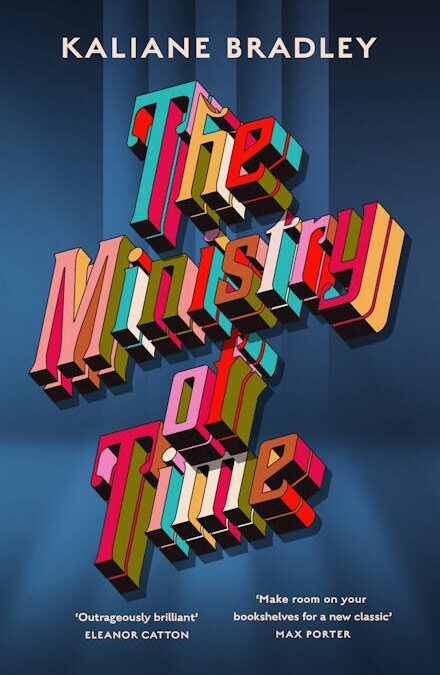The Ministry of Time (Sceptre Hachette 2024), the debut novel by Kaliane Bradley, is an assured and brilliantly crafted story that is both futuristic and historical, a love story and a thriller, an intimate deep dive into the lives of the characters and a broad brushstroke statement about technology and science and the ethical quandaries into which these fields may take us into the future.
Blurbed by names such as Max Porter, Diana Reid and Eleanor Catton, and pushed into my hands by both Laura Elvery and Mirandi Riwoe (thank you both, and sorry it took me so long …) this is a debut novel like no other. The characters and the ideas and themes will stay with me for a long time.
The wonderful opening premise is this: in the near future, humans are experimenting with time travel but are concerned about two things – the possible damage sustained by a human body if put through such an ordeal, and the possible repercussions of changing the course of history. A mysterious new government ministry decides that one way to explore both problems is to bring back from the past a select handful of relatively famous people (or people who at least have their lives and deaths well chronicled), under the assumption that because we already know what happened to these people and how and when they died, it would not change the course of history / time to bring them forward to now. And of course, by doing so, their physical, mental and emotional state can be studied to see how such a time traveller might fare.
And so it is that a bored civil servant is offered a lucrative and secretive position in The Ministry of Time, her role being to work as a ‘bridge’ between herself (and the modern world) and her specific expat; to live, work and monitor the expat as the experiment goes forward.
The book is mostly narrated by this bridge, although there are chapters from the perspective of her expat, Commander Graham Gore, a military man who died on Sir John Franklin’s doomed expedition to the Arctic in 1847 (in the form of journal entries). Graham Gore, or 1847 as he is known, is more than a little discombobulated and befuddled when he finds himself returned from the dead, to a different century and with an expectation that he will participate in this experiment. True to his time, 1847 smokes like a chimney, is horrified at the shameful prospect of ‘cohabitating’ with an unmarried woman, is bemused by the many maids the bridge has (‘washing machine’, ‘car’, ‘vacuum cleaner’), and is disconsolate not only at the knowledge that since his first death, the British Empire has all but collapsed, but also that he is able to discover the fate of many of his friends and colleagues not only from that disastrous expedition but from other avenues of his life too.
Over the course of a year, a subtle and nuanced friendship blossoms between the bridge and 1847, with delicious hints at a possible romance, weighty with the conflict of him being a man of his time and morals (courtship!) and the bridge with the knowledge that she is doing a job and should not be involved in any intimate relationship with her expat.
There are other expats – a woman from 1665, plucked from the Great Plague; a lieutenant from the 1645 Battle of Naseby; an army captain from the 1916 Battle of the Somme; and a woman from Robespierre’s Paris in 1793. These (along with 1847) are the five from an initial group of seven expats or refugees; two did not survive the time travel.
This is not a book I would have ordinarily picked up if not for the urging of my friends, who assured me I would love it. And I did. The futuristic setting is as thrilling and intense as any spy or espionage drama, complete with bureaucracy, red tape, reckless ambition and hidden agendas. The historical sections are short, succinct and faithful to real history (as acknowledged in the Afterword … very interesting.) But it is the characterisation that carries this novel – very strong and believable characters, each with a unique voice, each true to their time but also flexible (in different ways) to accommodating their new circumstances. The dialogue is pitch-perfect and the developing relationship dynamics between the bridge and 1847, and the other bridges and their expats, and between the bridges and the leaders of The Ministry, are compelling, engaging, intensely satisfying and anticipatory.
The other aspect of this novel that is so captivating is the thought-provoking ideas and moral / ethical questions thrown up by the situation and, as the story progresses, by the characters themselves, especially as they discover that all is not as they initially assumed, and that The Ministry may have an agenda quite different to what they have been told. At that point, the story becomes a full-on thriller, as the characters rush to understand what exactly they have got themselves into, and how they might each be contributing to a dangerous and controversial project.
The back of the book states, in part: ‘Can love triumph over the structures and histories that have shaped them (the characters)? And how do you defy history when history is living in your house?’
This novel is smart, clever, adept, intelligent, compassionate, empathetic, gruelling, confronting, witty and charming, with a fast-moving narrative, a tense and harrowed plot and endearing and unforgettable characters. Brilliant writing from a hand grenade of a premise that can only lead to intense conflict and emotion.

